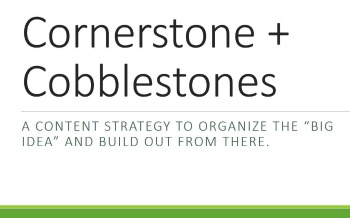Who are the millennial entrepreneurs? That’s a question the Business Journals sought to explore in a report released late last year entitled, Millennial Business Owners: Optimism Abounds.
The report surveyed over 1,300 millennial and boomer business owners and executives. It’s biggest failing is that it excludes Gen Xers, which would have made for a far-more robust look at the trends across the American business landscape.
That said, the report presents some interesting data about who these millennial entrepreneurs are and what they value — and how this might shape the future of business.
Millennial entrepreneurs eschew party labels.
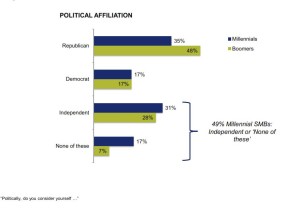
This isn’t surprising — because younger voters have been making it clear since at least 2008 that they don’t like party labels. But there are potential huge ramifications if millennial business owners hold to this pattern as they get older. I suspect they will — because I don’t buy into the cliche that getting richer makes you radically change your political perspective.
If this holds, what will the “business bloc” mean for U.S. money and politics in 10 and 20 years? While business owners likely will continue to join local chambers of commerce (after all, they are key connector hubs in many communities), will the national Chamber of Commerce maintain the same political impact and policy bent over time? If not, that could have fascinating implications for the business, HR, tax, and regulatory environment over time.
Millennial business owners are more diverse.
Diversity is a loaded word — and it means different things to different people. For me, “counting” is a starter metric that doesn’t really get you very far. But you have to start someplace, and the data shows that there are more millennial women-owned (41 percent) and minority-owned (28 percent) businesses than among the boomer cohort (28 percent and 9 percent respectively). To me, a more diverse entrepreneur base offers hope for approaching problems from fresh perspectives and bringing new ideas to market.
Millennial entrepreneurs want work-life balance.
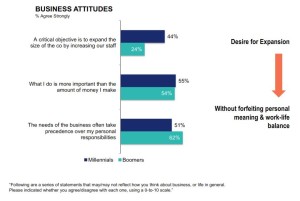
It’s not surprising that millennials value their “me” time, and I don’t take this to read that boomers do not. Rather, it’s another reminder that millennials are less willing to accept 24/7 work schedules — as employees or as business owners. The implications here speak to how companies of all sizes need to approach the way jobs are structured. Plus there are clearly ongoing opportunities to build products and services that can help busy business owners (and busy employees) juggle their competing responsibilities.
Millennials haven’t hit big roadblocks yet.
The Business Journals report has some interesting data on millennial optimism about the economy and saving for retirement while maintaining their current lifestyles, and significantly less concern than boomers about the costs of doing business, access to capital, and health care costs and the health care regulatory environment.
Surprised? I’m not. Millennials by definition are younger and haven’t hit these roadblocks yet. With the exception of retirement (which everyone should be stashing cash for), millennials are likely at some point to face most of these “costs” of doing business. Should they be worried? Of course not. But they should be prepared.
Millennials entrepreneurs care about sustainability.
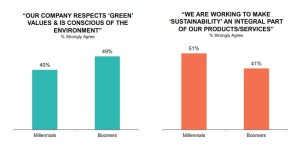
When asked what issue concerns them the most, 58 percent of millennial business owners said they were “very” or “somewhat” concerned about the environment (compared to 47% of boomer business owners). It’s easy to talk about this. I mean, who isn’t concerned about global warming right now?
But it’s where the rubber meets the road that the millennial distinction emerges: these business owners are working to bake sustainability into their businesses. If this holds true, then the way we operate, manufacture, and even think about running a business will shift over time in some potentially fascinating ways.
Millennial business owners think digital first.
I recently talked about two trends that you see emerge from this report: businesses need to be digital first and why so many businesses still don’t get it.
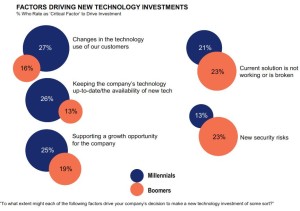
More and more business owners, of all ages and generations, are getting hip to technology. In fact, there’s data in here that both millennials and boomers are deploying technology and using social media in their businesses. But millennial entrepreneurs are digital natives — and this is giving them a decided edge.
Just look at the data in this one graphic, which illustrates the proactive approach to technology taken by millennial business owners versus the far more reactive approach by boomers.
If your business looks like the orange circles, then you have some strategic thinking to do about how well you are positioning your business to grow moving forward.
Download Millennial Business Owners and read it, because there’s a lot of meaty data to parse.

